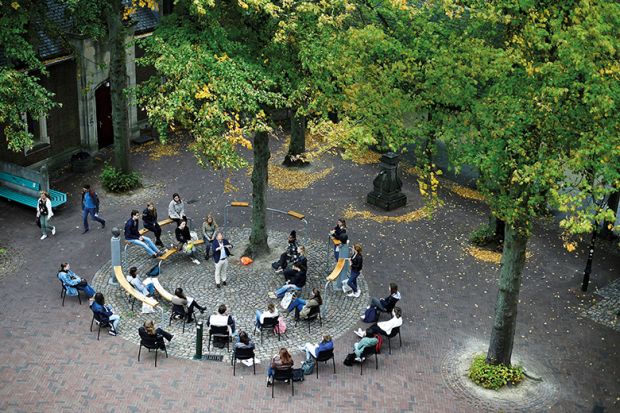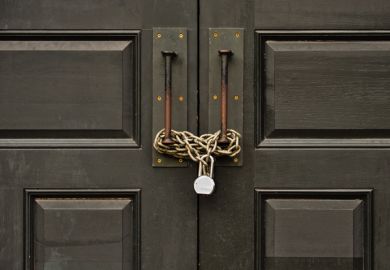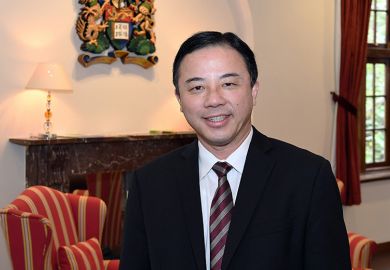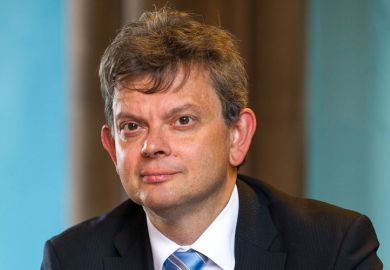Ingrid van Engelshoven, the Dutch minister for education, culture and science, was a shy student. As a political science undergraduate in the 1980s, she only started to get stuck into debate in the bar after class.
“I needed beers first,” she tells Times Higher Education – sitting at a safe distance – in her office in The Hague.
It was during these sometimes boozy arguments that she hammered out her views on the issues of the day – nuclear weapons, taxation, housing – and started to grow into a political animal who would eventually reach the Dutch cabinet.
“I think I never would have made it in politics if I hadn’t met people who challenged me [at university],” she says.
She acknowledges that much political debate has moved online in recent years. But, for van Engelshoven, thrashing out issues over social media is no substitute for doing so over Pilsner in a student bar.
“The beautiful thing about campus life…is that you meet people you didn’t plan to meet,” she says. “You see students who study other subjects. It makes your world bigger. These accidental meetings are so valuable.”
The coronavirus pandemic has forced every country on Earth to ration physical social contact. Football fans want to cheer from the stands. Parents want to throw confetti over their just-married offspring. Clubbers want to dance. Given these competing demands, how important is it to have students mingling on campus?
At one end of the spectrum on this question is neighbouring Germany, which has delayed the start of its academic year by a month, to the beginning of November, and will keep an estimated 90 per cent of classes online. University heads there have soberly emphasised the health risks of returning to campus and stressed that students can study independently.
Showing rather less caution is the US, where many colleges have flung open their doors to new students – and their tuition fees, of course – triggering, as predicted, a wave of coronavirus outbreaks, hasty closures and condemnation of perceived recklessness. A New York Times tracker has already identified at least 60,000 new cases at US colleges since late August, while academics have estimated that there were 3,200 new campus-related infections per day for the first two weeks of the autumn semester. In the UK, meanwhile, campus reopenings have led to headline news as students across Scotland and in Manchester have been required to quarantine themselves in their accommodation for two weeks to contain outbreaks.
The Netherlands is trying to steer a course between these two poles. Rectors and ministers have made a passionate case that face-to-face teaching and socialising is essential to the future of universities. Yet this is backed up by a meticulously prepared and collectively agreed national plan to avoid virus outbreaks, in the hope that campus life remains sustainable into the winter.
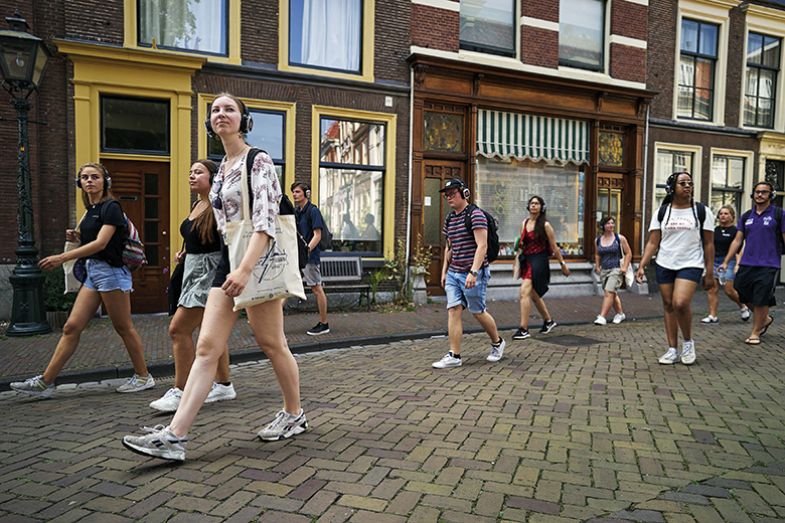
On paper, Eindhoven University of Technology (known by its Dutch acronym of TU/e) and Radboud University could hardly be more different.
The former was founded in 1956, largely to serve the nearby electronics giant Philips with skilled graduates. It still almost exclusively educates engineers, but, reflecting the downsized Philips’ own move out of electronics and into health technology, it now defines the term “engineer” more broadly, encompassing areas such as biomedicine. Its sculpted campus of gleaming glass and steel, bisected by bike lanes and rivers, now turns out graduates for a regional cluster of high-tech firms.
Radboud, on the other hand, is a comprehensive research university named after a 9th-century Dutch saint. Founded in the 1920s to educate the Netherlands’ previously underserved Catholic community in Nijmegen, its wooded campus – complete with former monastery – has educated four former Dutch prime ministers, as well as van Engelshoven herself.
Yet Radboud’s and TU/e’s coronavirus restrictions feel remarkably similar. Both campuses are operating at about 20 per cent capacity, so they conspicuously lack the usual bustle of a new academic year. Uniformed “corona control” personnel stand ready to explain the rules to the knots of newcomers dotted here and there. There is a lot of hand sanitiser but not many masks; instead, the emphasis in the Netherlands is on keeping at least 1.5m apart. Every room has a maximum capacity taped up on the door and arrows stuck to corridor floors mark out a one-way system to avoid congestion (many Dutch city streets have similar markings).
At both universities, the aim is to have students and staff on campus at least one day a week.
“There is a whole generation of new students who have never smelled the grass of this campus,” says Robert-Jan Smits, president of TU/e. Getting first-year students used to their new home, therefore, is seen as particularly crucial, and the former director-general for research and innovation at the European Commission is “extremely impressed” at how the sometimes divided Dutch university sector has managed to come up with a coherent plan to facilitate this.
Indeed, university presidents and the government have been in almost constant contact to chart a way forward since the Netherlands imposed what it called an “intelligent lockdown” in mid-March. Rather than impose mandatory measures, the country’s approach was to challenge each sector – transport, hospitality, universities – to come up with its own plan to make sure people kept their physical distance.
The Association of Universities in the Netherlands (VSNU) formed its own coronavirus crisis committee, which met daily and spoke with the minister herself about once a week. Back in April, prime minister Mark Rutte even dropped into two virtual university lectures to gauge the success of the digital transition (appropriately enough, one was on the mechanisms of social order).
The result of this dialogue is a periodically updated “service document”, plus other guidance, agreed by the universities and the government, which lays out the parameters for the reopening of campuses. There is scope for local flexibility, but, overall, Dutch universities have agreed to take a similar approach.
This is because Dutch universities realise that they are in a kind of prisoner’s dilemma: if one opened up more than the others and suffered an outbreak, then there’s a risk that campuses might have to shut nationwide.
“We try to have a common line,” says Smits. “Because then you can explain it to your own students. If we told our students that they could only come one day a week, and in Nijmegen you can come five days a week, I would get questions.”
Moreover, he adds, collaboration is wired into the Dutch psyche. “It all goes back to the fight against the water,” he says. “Holland is below sea level, so if cities and municipalities did not work together – if Amsterdam was always competing with Rotterdam for international trade – they would not work together in the fight against the water. Always, when there’s a crisis, the Dutch line up, and this is a beautiful example.”
It helps, Smits adds, that the country’s 14 university heads are a small enough group to all know each other personally, arguably taking the edge off the competitive instincts that characterise, say, the US sector (Hong Kong, another relatively small university system, has also coordinated similar levels of openness across its campuses).
Still, settling on a uniform approach to Covid-19 was not easy given the variety of institutional missions. Smits hints that some institutions wanted to go their own way, only to be “torn by the hair” back into line with a reminder that “if you don’t work together to keep the water out, we’ll all drown”. Indeed, TU/e itself has found it a “huge challenge” to adopt the agreed rules given engineering’s particular need for hands-on teaching – but Smits doesn’t complain about the fairness of a system that imposes the same restrictions on all institutions regardless of their subject mix.
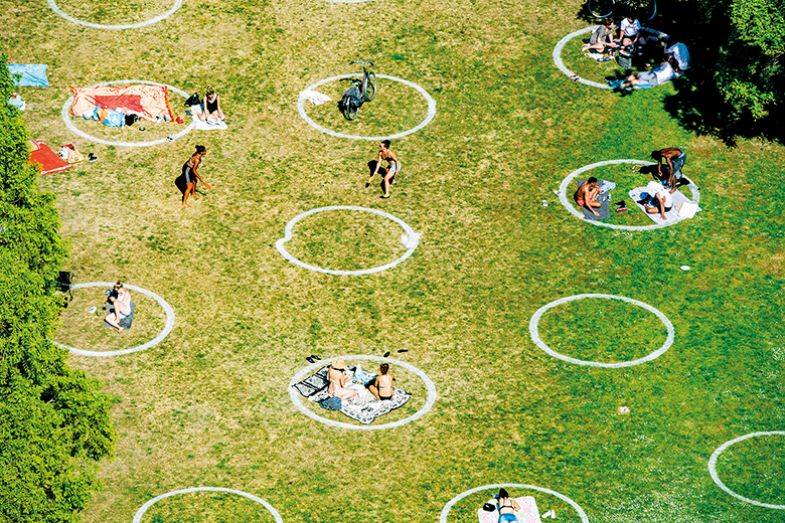
The Dutch government initially imposed rules that would have scuppered any attempt to return to even a remotely normal campus life. From mid-May to the beginning of September, teaching was only allowed between 11am and 3pm, and then after 8pm, in order to avoid overloading the tightly integrated transport network during rush hour. In such a small, built-up country, in which major cities are rarely more than an hour by train from one another, the public transport system is heavily used; the big ongoing fear, according to René van Donkelaar, TU/e’s graduate programme director, is that the government may introduce restrictions on students’ use of public transport if there is a spike in infections.
Hence, universities have devised their teaching timetables according to what they call a “dynamic rooftile model”, whereby beginning and end times are staggered across the hour such that classes, like rooftiles, only partly overlap.
Dutch universities also appear to have come to a compromise with the country’s sometimes hard-drinking fraternities, which are often organised along city lines and recruit members from multiple universities. A normal September might see inebriated new students swimming in canals or hurling rotting fruit at each other, but, this year, alcohol was restricted in fraternities during “initiation week”, while events had to end at 10pm. Instead, fraternities had to make their recruitment pitches during freshers’ fairs – with the surprising result that they attracted more members than ever. “They thought that no one would sign up, but they’ve had to turn down people,” Smits explains. “When there’s a crisis, you want to be part of a community.”
Since initiation week, the alcohol ban has been lifted, but fraternity members still have to stay 1.5m from one another. Of course, there is “stress on that system with alcohol involved”, admits Erik de Jong, TU/e’s community manager, but the consensus so far is that fraternities have largely behaved themselves.
The partying that goes on in private houses, however, is much harder to monitor and control. “How can you prevent people getting together if they are living with seven, eight, sometimes 16 people in one house?” asks de Jong.
TU/e has tried to lure students away from more risky situations by organising socially distanced outdoor events, with alcohol available but with duration restricted to two and a half hours: “enough time to have a couple of drinks but not get drunk”, according to de Jong.
Meanwhile, a walk around Nijmegen during initiation week reveals circles of physically distanced new students getting to know each other in parks or on the riverfront without any booze in sight.
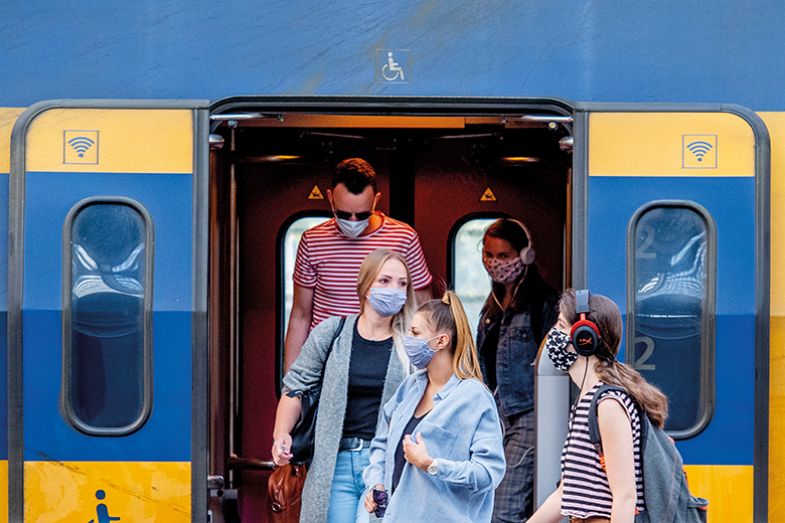
Despite all these precautions, Dutch rectors have still had to fight publicly for universities’ ration of physical contact. In June, all 14 published a joint letter calling for restrictions on teaching times to be dropped and warning that “a generation of students will be lost if we cannot soon revive crucial physical contact”. This conviction relates to the Dutch concept of “Bildung”, which translates into English as “education”, but also encompasses the notions of growing up, developing and even becoming a personality. Having fun isn’t treated as some grubby, tacitly tolerated distraction from study, but as an essential part of being a student.
This idea has deep roots in Dutch history, points out Paul Koenraad, dean of TU/e’s graduate school. As far back as the 17th century, some Dutch students were exempt from tax on two commodities: books and beer.
“Really, the student experience is a social experience,” he stresses. “That’s never ever going to go away. On campus, together with your students, that’s the future, that was the past, and that will remain. That’s my personal conviction.”
It is also the conviction of the LSVb, the country’s main student organisation, and it is worried that universities haven’t gone far enough in returning students physically to campus. According to the organisation’s chairman, Lyle Muns, online education leaves students at risk of loneliness, disadvantages those who lack space at home, limits in-depth class discussion and risks forcing students to socialise in riskier private spaces.
But even opening up campuses partially has been a considerable management challenge, says Han van Krieken, rector of Radboud. “If we went for online-only, it would make life for support staff and teachers much easier,” he says.
Hard-pressed lecturers, who, in March, scrambled to switch their courses online, are now being asked to convert some of their teaching back into physically distanced space. In addition, they need to continue to provide a digital alternative for students who feel ill – and might otherwise risk a campus visit – and for international students who have not yet travelled to the Netherlands. “You need to have the online fallback option at all times,” van Krieken stresses.
The pandemic has also strained Dutch universities' finances, he says, forcing Radboud to dig into its reserves; a VSNU spokesman says it is “very likely” that other institutions will have to do the same.
“Our costs have risen enormously,” says van Krieken. Cloud space, for instance, has had to be rented to host video lectures because local networks are unable to handle the massive spike in traffic. Radboud has also hired two concert halls in the city – at €250,000 for a six-month lease – to create extra space for lectures – all while losing income due to mothballed catering services.
Adding to universities’ financial anxieties has been a clamour – mirroring similar demands in the UK and US – from some student groups for a refund of tuition fees because of the curtailment of physical teaching earlier this year (tuition fees for Dutch and EU students are currently €2,143 a year, halved for the first year).
But minister van Engelshoven says that only students whose graduation is delayed by the pandemic will receive any kind of compensation. “I agree with universities that it didn’t get any cheaper [to teach online],” she says. “They really need the money now to invest in good digital education, but also in high-quality student-teacher contact.”
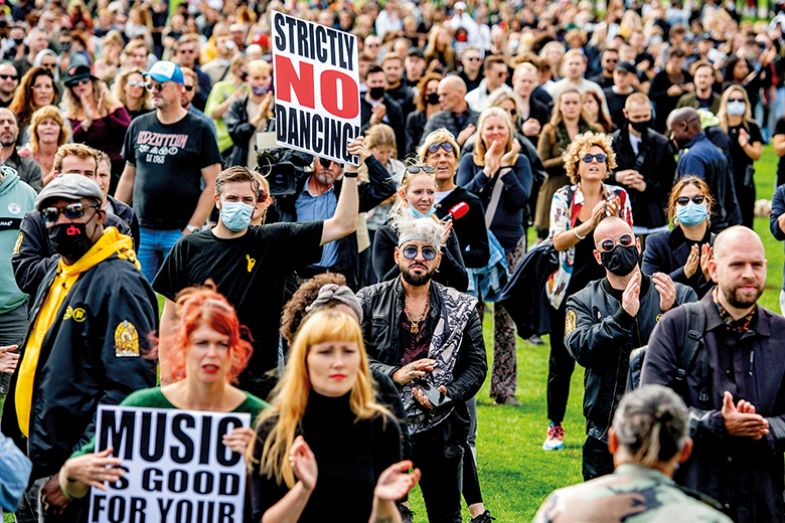
With a long autumn and winter ahead, any conclusions drawn now about the success of the Netherlands’ campus reopening are hostage to fortune. But, as THE went to press, neither the VSNU nor the LSVb had reported any Covid outbreaks on campus (although some students have fallen ill after socialising at home or in bars).
As for student demand, registrations are actually more than 7 per cent up on last year as Dutch students scrap their plans for gap years abroad, explains Pieter Duisenberg, president of the VSNU. Although universities won’t have final figures for how many students have actually turned up on campus until later in October, the signs are good so far, Duisenberg says.
International student numbers have also held up year-on-year, although there has been a shift towards EU students, rather than those coming from countries further afield, such as China. Still, the experience of the pandemic seems to have confirmed to sector leaders the risks of over-reliance on fees; even prior to the pandemic, Smits was warning that a scramble for international fees has not only made UK universities financially vulnerable but also created homogeneous departments, often overly dominated by Chinese students. The proportion of Dutch university income from tuition fees overall grew from 7 per cent in 2004 to 9.5 per cent in 2018, according to data from the Rathenau Institute, a thinktank.
Minister van Engelshoven declines to directly criticise high-fee systems, but agrees that “if you have to lock down, higher tuition fees are an extra risk”, while modest tuition fees keep universities “flexible”.
The mood on Dutch campuses, however, is certainly not one of smugness or self-satisfaction. Instead, there is a wistful longing for the bustle and excitement that should have been. It is almost as though some academics are surprised at how much they miss the crush of new students. And while students are assumed to be grateful for any physical interaction given the circumstances, the dry induction week was “almost sad to see”, TU/e’s Koenraad confesses.
Signs of enforced isolation are everywhere. At TU/e, seats in communal spaces are turned so as not to face each other. Desks that students once crowded around for group work are now lined up in serried rows, all facing forward, towards a chalk board. The Innovation Space, designed specifically to facilitate chance encounters and sparky discussions over pizza and beer, is strictly marked to avoid loitering and overcrowding.
As for Radboud, “before summer, it was terrible, because nobody was there,” says van Krieken. “Now there are a few more people, but still, if you walk around, it’s totally different.”
The hope is that this restraint means that at least a part of the Dutch “Bildung” will be preserved throughout this academic year. But it remains to be seen whether, in 30 years' time, Dutch politicians from the class of 2020 will reminisce to journalists about the life-changing campus conversations they managed to have even during a pandemic.
POSTSCRIPT:
Print headline: The Netherlands’ opening gambit
Register to continue
Why register?
- Registration is free and only takes a moment
- Once registered, you can read 3 articles a month
- Sign up for our newsletter
Subscribe
Or subscribe for unlimited access to:
- Unlimited access to news, views, insights & reviews
- Digital editions
- Digital access to THE’s university and college rankings analysis
Already registered or a current subscriber? Login
